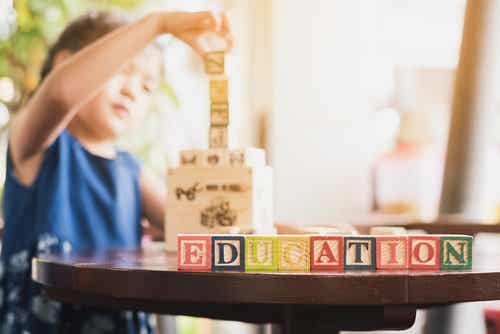Why Teach Basic Competencies During Childhood?

There’s one main reason why the acquisition of basic competencies during childhood is important: It facilitates the development of children in whatever stage they’re in, helping them face the future and adult life.
By learning basic skills, children acquire the necessary tools they’ll need to face the various challenges that life will put in their way as they develop.
Acquiring the 8 basic competencies
Currently, school curriculum establishes 8 basic competencies. To a greater or lesser degree, all young people in school must acquire them throughout the educational phase. These are:
- Mathematical competence
- Competence in linguistic communication
- Personal initiative and autonomy
- Competence in interaction with and knowledge of the physical world
- Citizenship and social competence
- Treatment of information in digital competence
- Artistic and cultural competence
- Competence in learning to learn

When children acquire these competencies to a greater or lesser extent according to their natural abilities and talents, in the future, they’ll be able to respond to the basic aspects of today’s society.
Therefore, the idea is for children to learn to perform their daily activities autonomously. Once they acquire these basic competencies, they become more integrated in society. And, at the same time, they incorporate diverse learning, which they relate to different situations and contexts that arise on a daily basis.
Basic competencies
Now, let’s look at what these competencies consist of. All educational centers must address these competencies in order to assure that their students acquire them and become familiar with them.
Competence in linguistic communication
First, the acquisition of linguistic competencies helps children to learn the correct use of language on a written and oral level. In addition, they discover how to interpret it, how to understand it, and how to differentiate according to the communicative context in which it occurs. In turn, they learn to form critical judgments, make decisions, and generate ideas.
Furthermore, it’s also helpful for children to study foreign languages so that they can communicate in an increasingly globalized world. This way, they learn to establish appropriate social relationships and to better manage in different social contexts.
Mathematical competence
In this case, children learn the ability to use numbers, both in regard to daily life and in the use of basic operations. They learn the mathematical reasoning necessary for the interpretation of information, for problem-solving, and for the expansion of knowledge. And, at the same time, children gain knowledge that will be useful in their everyday family and work life.
Competence in interacting with and knowledge of the physical world
This skill leads children to learn mechanisms for autonomous development in the world. It teaches them various areas, from consumption to health, so that they know how to analyze, interpret, and reach valid conclusions in different real contexts.
Digital competence and information processing
In a globalized and interconnected world like ours, this competence is vital for them to learn how to obtain and process information. Thus, they can convert it into knowledge and access it from different media.
More basic competencies

Citizenship and social competence
This skill includes the ability to know yourself and learn to value yourself as you deserve. In that regard, it teaches children how to communicate their own ideas, practice active listening, and accept and analyze diverse points of view. Furthermore, it shows them how to value and defend their own interests in a group context in a civic manner.
Artistic and cultural competence
This refers to the child’s ability to understand, know, value, and critically appreciate any artistic manifestation. For this purpose, they’ll receive varied resources of expression.
Learning to learn
This is the learning of life. That’s to say, it refers to children discovering that they’ll always be learning and that they’ll do it in an autonomous and efficient way once they’ve passed the school stage, with awareness and control of their abilities, using study techniques and adequate motivation.
Personal initiative and autonomy
This shows the child the need to be persevering, creative, and responsible. It also teaches them the importance of self-control and the ability to exercise self-criticism without losing self-esteem. In this way, they’ll improve their skills and have a strategic vision to plan opportunities and challenges.
About core competencies
To conclude, it goes without saying that it’s very important for children to acquire basic competencies during childhood in order to receive the appropriate education for their development and future.
There’s one main reason why the acquisition of basic competencies during childhood is important: It facilitates the development of children in whatever stage they’re in, helping them face the future and adult life.
By learning basic skills, children acquire the necessary tools they’ll need to face the various challenges that life will put in their way as they develop.
Acquiring the 8 basic competencies
Currently, school curriculum establishes 8 basic competencies. To a greater or lesser degree, all young people in school must acquire them throughout the educational phase. These are:
- Mathematical competence
- Competence in linguistic communication
- Personal initiative and autonomy
- Competence in interaction with and knowledge of the physical world
- Citizenship and social competence
- Treatment of information in digital competence
- Artistic and cultural competence
- Competence in learning to learn

When children acquire these competencies to a greater or lesser extent according to their natural abilities and talents, in the future, they’ll be able to respond to the basic aspects of today’s society.
Therefore, the idea is for children to learn to perform their daily activities autonomously. Once they acquire these basic competencies, they become more integrated in society. And, at the same time, they incorporate diverse learning, which they relate to different situations and contexts that arise on a daily basis.
Basic competencies
Now, let’s look at what these competencies consist of. All educational centers must address these competencies in order to assure that their students acquire them and become familiar with them.
Competence in linguistic communication
First, the acquisition of linguistic competencies helps children to learn the correct use of language on a written and oral level. In addition, they discover how to interpret it, how to understand it, and how to differentiate according to the communicative context in which it occurs. In turn, they learn to form critical judgments, make decisions, and generate ideas.
Furthermore, it’s also helpful for children to study foreign languages so that they can communicate in an increasingly globalized world. This way, they learn to establish appropriate social relationships and to better manage in different social contexts.
Mathematical competence
In this case, children learn the ability to use numbers, both in regard to daily life and in the use of basic operations. They learn the mathematical reasoning necessary for the interpretation of information, for problem-solving, and for the expansion of knowledge. And, at the same time, children gain knowledge that will be useful in their everyday family and work life.
Competence in interacting with and knowledge of the physical world
This skill leads children to learn mechanisms for autonomous development in the world. It teaches them various areas, from consumption to health, so that they know how to analyze, interpret, and reach valid conclusions in different real contexts.
Digital competence and information processing
In a globalized and interconnected world like ours, this competence is vital for them to learn how to obtain and process information. Thus, they can convert it into knowledge and access it from different media.
More basic competencies

Citizenship and social competence
This skill includes the ability to know yourself and learn to value yourself as you deserve. In that regard, it teaches children how to communicate their own ideas, practice active listening, and accept and analyze diverse points of view. Furthermore, it shows them how to value and defend their own interests in a group context in a civic manner.
Artistic and cultural competence
This refers to the child’s ability to understand, know, value, and critically appreciate any artistic manifestation. For this purpose, they’ll receive varied resources of expression.
Learning to learn
This is the learning of life. That’s to say, it refers to children discovering that they’ll always be learning and that they’ll do it in an autonomous and efficient way once they’ve passed the school stage, with awareness and control of their abilities, using study techniques and adequate motivation.
Personal initiative and autonomy
This shows the child the need to be persevering, creative, and responsible. It also teaches them the importance of self-control and the ability to exercise self-criticism without losing self-esteem. In this way, they’ll improve their skills and have a strategic vision to plan opportunities and challenges.
About core competencies
To conclude, it goes without saying that it’s very important for children to acquire basic competencies during childhood in order to receive the appropriate education for their development and future.
This text is provided for informational purposes only and does not replace consultation with a professional. If in doubt, consult your specialist.








